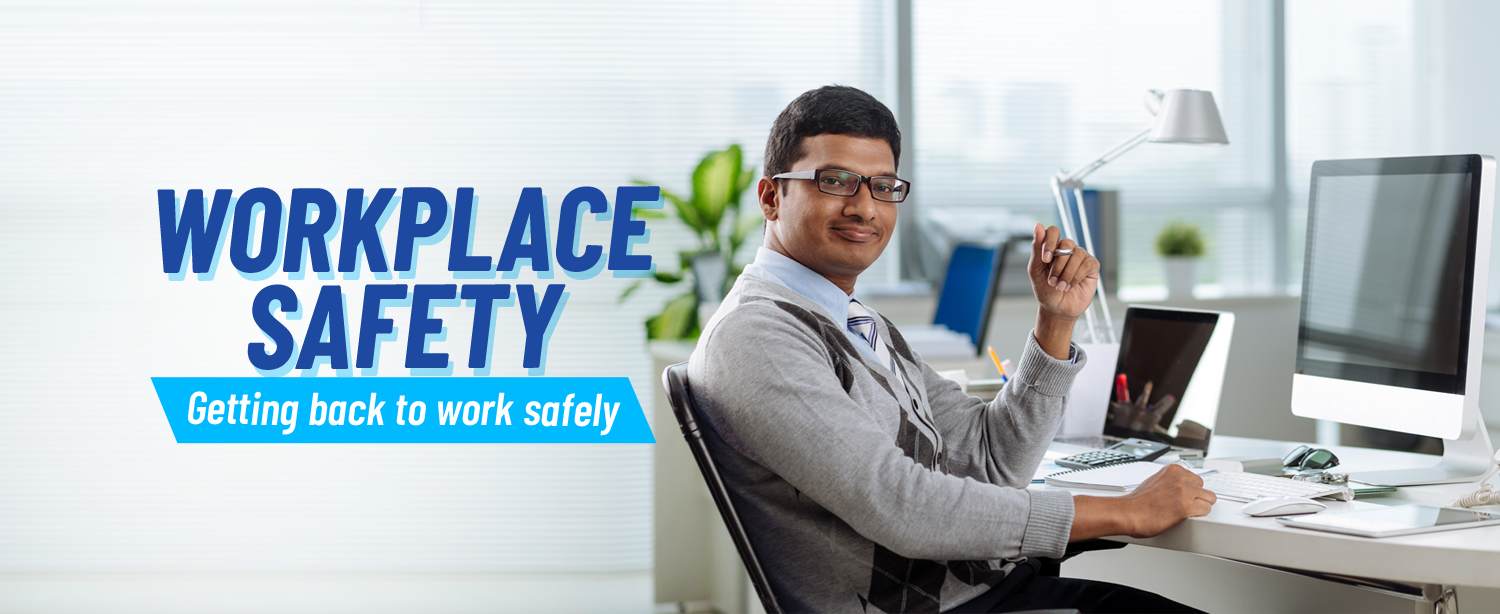The future of work looks very different than it did just a few months ago. While some will have to continue to work from home others may have resumed office and this may increase the rate of transmission. Exposure can occur in the workplace while commuting to work or during work-related travel. The employees and the organization both will have to find new efficient ways of working while ensuring everyone’s safety. As businesses reopen in the ‘New Normal’, communication and personal hygiene are more important than ever. Clear policies and messages, training, and constant reminders at the organization are required to increase the awareness of the new safety precautions. Following high levels of personal hygiene is also crucial to fight this pandemic.
Workplace safety protocols to be followed
The implementation of safety protocols will limit the exposure to COVID-19 and will, in turn, reduce the rate of transmission at the workplace. Both employers and employees must take utmost precautions to help reduce the spread of the infection. Here are a few guidelines to follow:
For employees:
Here are a few steps that employees can take to protect themselves and others at work:
- Wash their hands often with soap and water for at least 20 seconds or to use hand sanitizer with at least 70% alcohol if soap and water are not available.
- Key times for employees to clean their hands include:
- Before and after work shifts
- Before and after work breaks
- After blowing their nose, coughing, or sneezing
- After using the restroom
- Before lunchtime
- After putting on, touching, or removing cloth face coverings
- Avoid using other employee’s phones, desks, offices, or other work tools and equipment.
- Cover their mouth and nose with a tissue when you cough or sneeze, or use the inside of their elbow. Dispose of these tissues safely in a covered dustbin,
- Stay home if they are sick and seek medical help if required.
- Avoid sharing your lunch and eat your lunch in your own workspace.
- Practice social distancing by avoiding large gatherings and maintaining distance (at least 6 feet) from others.
For the employers
Here are a few steps that employers can take to protect themselves and others at work:
- Practice routine cleaning and disinfection of premises and frequently touched objects and surfaces such as workstations, keyboards, telephones, handrails, and doorknobs.
- Call the staff to office in staggered shifts to avoid crowding.
- Use thermal scanners to monitor the temperature at entrance.
- Ensure regular supply of hand sanitizers(especially at the entrance), soap, and running water in washrooms.
- Discourage visitors in the office complex unless absolutely necessary.
- Encourage meetings via video conferencing.
- Encourage email correspondence instead of physical copies.
- Facilitate work from home option whenever required.
Healthy living habits for better immune health
A balanced and nutritious diet and healthy lifestyle choices will help reduce your risk of getting COVID-19. Maintaining a healthy diet contributes to high energy levels, improves your brain function, and helps ward off diseases. A strong immunity helps reduce your risk of getting the infection at your workplace or while you travel. Here is a routine that you can follow to help build a strong natural defence system:
Start your day with a healthy breakfast
Including vegetables like carrot, spinach, sweet potatoes, garlic, dark leafy greens, tomato, and broccoli; and fruits like papaya, oranges and other citrus fruits, that contain vitamins A, C, D, and E, and minerals like magnesium, selenium, and zinc to your daily breakfast routine is the first step to build up a strong defence system.
Get good sleep
A human body naturally repairs and recovers, during sleep, from all the wear and tear. Ensure that you get at least 7 to 8 hours of sleep daily.
Stay hydrated
Staying hydrated flushes out all the toxins from the body. Have 8 to 10 glasses of water throughout the day.
Make some time for exercise
Try exercises like power yoga, skipping, push-ups, jogging on the spot at home.
Practice meditation
A mere 10 minutes of meditation every day can make a big difference. A calm mind helps in better focus and helps strengthen your immunity.
The unlock has begun, the businesses are opening up and the world is getting back to the routine. Make sure you return even stronger and ensure your safety first as you start getting busy in various professional commitments. While attending meetings and finishing other pending tasks do not forget to maintain personal hygiene. Together we can help limit the spread of COVID-19 transmission. Stay safe and healthy as you get back to your workplace.


